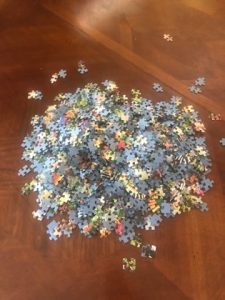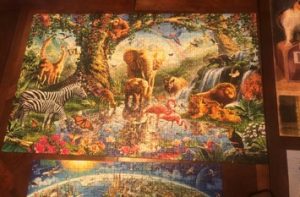For the initial six weeks of the pandemic last year, I was not allowed to work. I had not had six weeks off from work since I left home at 17 for my first full time job, at a summer camp. While I didn’t work full time during school, I always had one, sometimes two and often three part-time jobs, including short-order cook, resident adviser, building director, lifeguard, and book-store clerk. As a law student, I worked during the summers, and for 42 years thereafter, I have worked, with never more than 2 weeks off or between jobs. So six weeks was a shock to my system.
And this was a difficult six weeks, with the first of the staggering “stay at home,” orders. Really? Even if you did go out, there was nothing left to do. One by one, the gyms, the parks, the tracks, all closed. Everyone looked at you with fear, like you were one of those on the “Walking Dead.”
Like most people, I watched a lot of Netflix shows that I thought I would like, but really didn’t. Then I noticed there were a lot of things streaming on various services that I knew I wouldn’t like, but I watched them anyway.
Three weeks in, my wife got out a crossword puzzle she had been meaning to do for years. It was a hard one, depicting a pack of zebras, each with stripes of several similar shades of black and brown balancing against the several similar shades of dirty white stripes. The zebras were drinking from a murky pond that reflected their similar, murkier images. The pieces were tiny, and they all looked pretty much the same. My wife did a little, then left it on the table. It stayed there for a while, tempting my severely offended sense of order in the universe.
One night I could watch no more Netflix and I sat down to see if I could move the project forward. I didn’t get up for three hours. I had only placed about 20 pieces, but I was hooked. For the next few days, the zebra puzzle was the first thing I did in the morning and the last thing I did at night. I found myself walking by, and being drawn in, then losing track of time. I was not going to let those zebras beat me. So much of the world seemed to be falling apart. Here was my chance to put things back together, to bring order to a meaningless jumble of black and white.
When I was finally done, my wife found that she liked the effect of the project on me. She found another puzzle in another closet. Then she borrowed some puzzles from our neighbors, who had a large collection. Then she started buying puzzles online, challenging me with maps of the world, complex multicolored jungle scenes, tiny pictures of helicopters set against gently shaded backgrounds. I would not give up. I found a way to pile the finished puzzles on top of each other so that there was room to do the next one, and because I couldn’t bear to mess them up and put them back in the box.
Even piling puzzles on top of each other, it became difficult to fit them all on our dining room table. Finally, my brother and his son came by, and we gave my nephew the fun job of breaking up all the puzzles and getting them back into boxes. It was hard for me, but in a few days I could return to work, and to the illusion that the work I did each day was helping to put the world back in order.
I wondered: Did I learn something from this exercise, or had this time been wasted as much as the time I spent watching Tiger King?
So I sat down and tried to write out a few of the lessons learned.
- Don’t just notice things, examine them. One wave on the ocean looks pretty much like other waves on the ocean until you look really closely. Then each one has its own shape and beauty. Likewise, there are many shades of orange and yellow and beige. At first they look like each other, but each is a little different, and they are all reflected in the sunset.
- Every overwhelming task can be accomplished by organizing it into smaller jobs. Leave out the big picture, and just focus on the little red building until it’s done. The bigger picture of the town will take care of itself, eventually.
- When you can’t get anything more done, sleep on it. The morning surprises with insight that was there all along. Everything is easier to see in the morning light, and you see things you couldn’t see the previous night.
- When you’re stuck, get up and walk around, and come back later.
- Some people succeed by being brilliant. Others succeed by being unwilling to give up. I’m in the latter category. Remember, there is success for people in both categories.
- It feels good to solve a small problem when you can’t solve the larger problem. I found this was true when I got back to work. I couldn’t solve the problems of the pandemic and the conflicts it created. But I could solve the problems that were right there in front of me. That was my job after all, both before and after.
- It feels good to make a small amount of order in a world of chaos. This lesson was learned not only by doing jigsaw puzzles, which were metaphors for the world’s chaos. It could be learned in the little things, like making your bed, doing your laundry, doing your taxes, cleaning out old papers from your office.
- It is easier to see the differences in people than the differences in objects. Because that’s what we’re always looking for to help us recognize and name. But the beauty of the world also has many shapes and colors, and these should be catalogued, appreciated and enjoyed.
There are more things I learned, of course. Stay away from puzzles of zebras, for example.
I was happy to return to work. It takes the energy out of me so that I don’t need to do jigsaw puzzles to keep from going stir crazy.
I’m glad for the lessons I learned from jigsaw puzzles. Wish I could say I was glad I watched all those shows on Netflix. But I really can’t.

Chaos

Order


Recent Comments